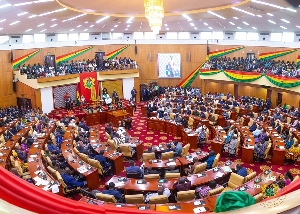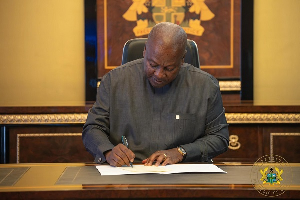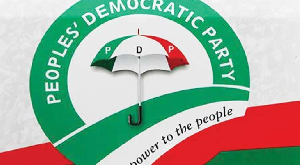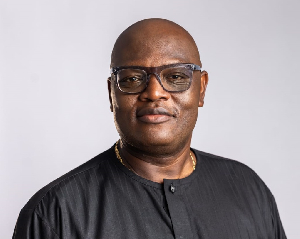The First Meeting of the Fourth Session of the Eighth Parliament of the Fourth Republic of Ghana reconvened on Tuesday, February 6, amid significant moments in the country’s political landscape, marked by several key occurrences and highlights that shaped the direction of governance.
The period saw significant events that shaped the country’s legislative landscape. Parliament played a key role in addressing pressing national challenges and promoting progress, from engaging in legislative debates to successfully passing critical Bills.
The meeting began on a historic note, with the implementation of new Standing Orders (written rules governing parliamentary proceedings), the previous one having undergone significant revisions after serving Parliament for nearly 30 years. The revised Standing Orders included innovative practices and procedures such as a roll call and the recital of the National Pledge.
Other provisions of the new Standing Orders included conducting Parliamentary Business through virtual platforms, open Committee Sittings, and a clear delineation of the hierarchy of Parliament’s leadership.
The provisions in the new Standing Orders were aimed at addressing the evolving needs of Ghana’s dynamic and hybrid parliamentary democracy and to enhance the effectiveness of parliamentary processes and procedures, in response to the changing landscape of Ghana’s political system.
Parliament had subsequently trained Members of Parliament (MPs), Parliamentary staff, Civil Society players and the Parliamentary Press Corps on the new Standing Orders.
The exit of the Black Stars from the 2023 Africa Cup of Nations at the group stage propelled the organisers of the “Save Ghana Football” demonstrators to present a 15-point petition to the Speaker of Parliament, Mr Alban Sumana Kingsford Bagbin, which was received by the Leadership of the House. The petition elicited a passionate debate on the Floor of Parliament. The petition was referred to the Committee on Youth, Sports and Culture for investigation and report to the House.
Further, the First Meeting of the Fourth Session of the Eighth Parliament of the Fourth Republic of Ghana recorded a novelty when two MPs presided over proceedings in the absence of the Speaker and his two deputies.
As a result, the Clerk to Parliament, Mr Cyril Kwabena O. Nsiah, under Standing Order 12(4), invited nominations from the House for a member to preside over the sitting proceeding.
Mr Kwasi Ameyaw-Cheremeh, the New Patriotic Party (NPP) MP for Sunyani East, was elected to chair proceedings for Friday, February 16.
In subsequent days, Mr Kobina Tahir Hammond the NPP MP for Adansi Asokwa, and Minister of Trade and Industry, also took the chair as Member Presiding due to the absence of the Speaker and his two deputies on Tuesday, March 5.
In an unexpected turn of events, in the Chamber of Parliament of Ghana, Mr Osei Kyei-Mensah-Bonsu, the long-serving Leader of the Majority Caucus, resigned from his position which he described as a voluntary decision.
He was replaced by Mr Alexander Kwamena Afenyo-Markin.
Following his announcement on the Floor of his voluntary resignation, Mr Kyei-Mensah-Bonsu also the NPP MP for Suame made a statement in which he informed the House of his voluntary decision to resign as the Majority Leader and Leader of Government Business.
Consequently, the NPP after nominating Mr Afenyo-Markin, the Effutu legislator, as the new leader, President Nana Addo Dankwa Akufo-Addo also nominated Madam Lydia Seyram Alhassan, the former Deputy Majority Whip, and MP for Ayawaso West Wuogon as the Minister for Sanitation and Water Resources which necessitated further changes in the leadership of the Majority Caucus as follows: Mr Afenyo-Markin, Majority Leader; Madam Patricia Appiagyei, MP for Asokwa, Deputy Majority Leader; Mr Frank Annoh-Dompreh, MP for Nsawam-Adoagyiri, Majority Chief Whip; Mr Habib Iddrisu, MP for Tolon, First Deputy Majority Whip and Mr Alex Tetteh Djornobuah, MP for Sewfi Akontombra, Second Deputy Majority Whip.
Another notable event during the meeting was the delivery of the Message on the State of the Nation by President Akufo-Addo, by Article 67 of the 1992 Constitution. The details of the president’s speech gave insights into the county’s development trajectory, challenges, and vision. The meeting witnessed the introduction of some notable Bills and legislative proposals aimed at addressing key issues facing the country. These issues ranged from economic development to social welfare and governance reforms.
Parliament passed significant Bills, including the Death Penalty Bill, Witchcraft Bill, Ghana Anti-doping Bill and the Human Sexual Rights and Family Values Bill.
The latter Bill also known as the Anti-Gay Bill received support from a coalition of Christian, Muslim, and Ghanaian traditional leaders, and backing among MPs. Meanwhile, some of the Bills are yet to be assented to by the President, who, in various communications signed by his secretary to the Clerk to Parliament, is alleged to have assigned reasons, including citing two pending legal actions at the Supreme Court, as reasons for his not being able to assent to the Bills.
The Speaker of Parliament, Mr Bagbin in his reaction, had described one of the letters as “contemptuous of Parliament, the wrong application of the dangerous legal principle of interim injunction and an affront to the tenets of democracy.
Speaker Bagbin in the same vein, also brought to the attention of the House, the receipt of a process from the Court by Mr. Rockson-Nelson Este Kwami Dafeamekpor, a National Democratic Congress (NDC) MP for South Dayi which sought to restrain the Speaker from proceeding with the vetting and approval of the names of the persons submitted by the President until the provisions of the Constitution are satisfied. Applying the same principle, the Speaker stated that the House was unable to continue to consider the nominations of the President in the “spirit of upholding the rule of law until after the determination of the application for an interlocutory injunction by the Supreme Court.”
A quotation Mr Bagbin borrowed from the letter of the Secretary to the President.
A notable happening during the Meeting was the sombre and melancholic moments during one Sitting of the Meeting, the passing of former MP for Ejisu and Deputy Minister for Finance, Dr John Ampontuah Kumah on Thursday, March 7 March 2024.
The 1st Meeting of the 4th Session of the 8th Parliament of Ghana was marked by significant acts, critical to legislative and political development.
The role of the Speaker of Parliament was crucial in facilitating productive debates and maintaining order in the Legislative Chamber.
He was instrumental in ensuring the smooth functioning of Parliament and upholding democratic principles.
Parliament has since gone on recess and is expected to commence the Second Meeting of the Fourth Session of the Eighth Parliament when an official date is communicated by the Speaker by Clause (1) of Article 112 of the 1992 Constitution.
General News of Monday, 8 April 2024
Source: GNA













